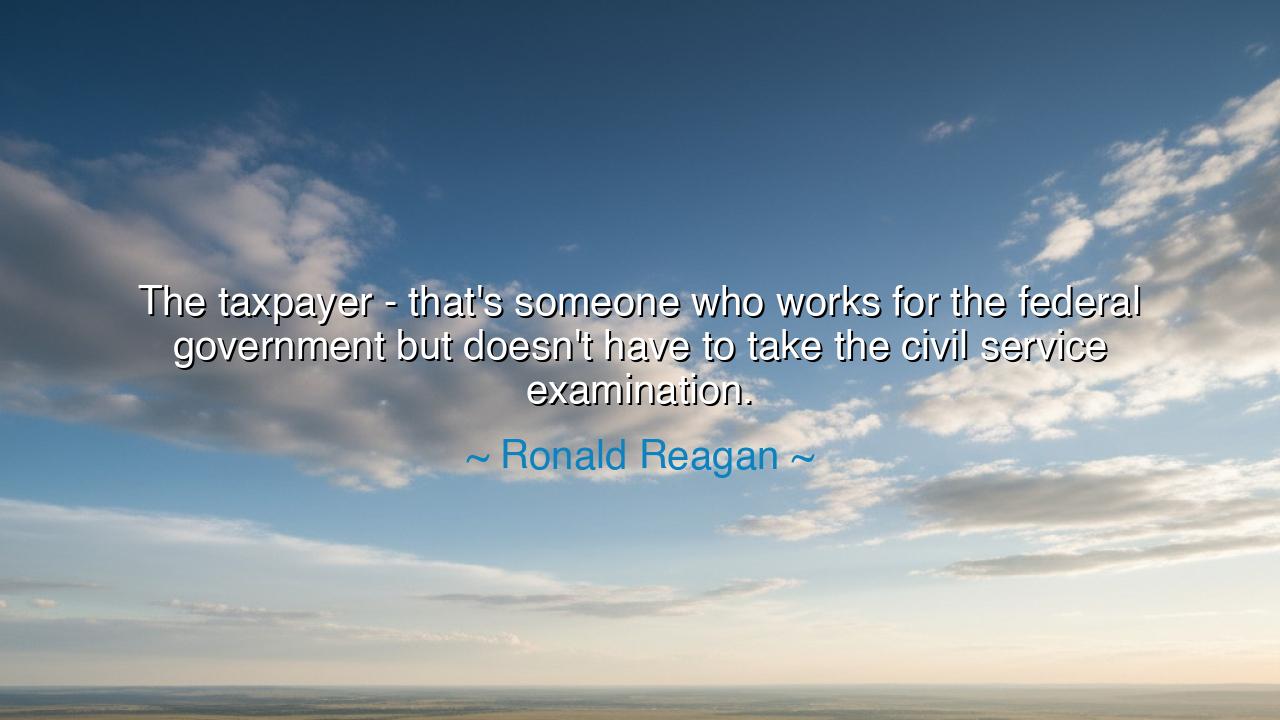
The taxpayer - that's someone who works for the federal
The taxpayer - that's someone who works for the federal government but doesn't have to take the civil service examination.






"The taxpayer — that's someone who works for the federal government but doesn't have to take the civil service examination." — Ronald Reagan
In these words of wit and warning, Ronald Reagan spoke with the voice of a man who had seen the great machine of government grow too large, too hungry, too blind to the burdens it placed upon its own people. Beneath the laughter this quote invites lies a truth ancient as civilization itself: that when rulers forget whom they serve, the citizen becomes the servant, and the taxpayer, though never sworn into office, toils endlessly to sustain the weight of those who govern him. Reagan’s humor, like that of the wise jesters of old, pierces deeper than anger ever could — for through it he exposes the quiet injustice that arises when the state consumes more than it gives, and the worker labors not for his own dream, but for the endless appetite of the bureaucracy.
Reagan spoke during a time when faith in government had withered. The twentieth century had seen nations fall under the spell of central planning and unchecked authority. From the cold inefficiency of socialist regimes to the sprawling bureaucracy of democratic ones, the story was the same: government, once a servant, had become a master of masters. The taxpayer, the humble builder, the craftsman, the farmer, and the teacher — these became the silent laborers behind the curtain, the ones who paid the price for inefficiency, waste, and corruption. And yet, Reagan reminded them with a wry smile that they were the true workforce of the state, though none had applied for the job.
The civil service examination, once a symbol of merit and discipline, represented those who served within government. But Reagan’s quip turns the image on its head: the taxpayer, too, serves the government, though unwillingly and without recognition. He wakes before dawn, tills the soil, designs, builds, teaches, heals — and yet, a portion of all he earns flows inexorably upward, to feed the vast machinery of the state. This, Reagan implies, is not the natural order, but the result of imbalance — when the government grows fat while the people grow weary. His humor cuts like a blade through the rhetoric of bureaucracy, revealing a truth every free people must remember: the state has no money of its own. Every coin it spends was first earned by someone’s sweat.
History is filled with the echoes of Reagan’s warning. In ancient Rome, as the empire expanded, taxes rose to feed its legions and its luxuries. Farmers were crushed beneath levies they could not pay, and small landholders sold their fields to the wealthy to escape ruin. The people of the republic, once proud citizens, became dependents of the state — their liberty traded for bread and circuses. The taxpayer became the empire’s captive. And when the burden grew too great, when the producers could bear it no longer, the empire itself began to crumble. Thus it is written in the fate of nations: no government can endlessly consume without consuming the very heart of its people.
Yet Reagan’s message is not one of despair, but of renewal. He believed, as the ancients did, that freedom and responsibility are the twin pillars of a just society. The citizen who works, creates, and pays his share is not the servant of government but its sovereign — and the government that forgets this truth loses its moral foundation. “We are a nation,” Reagan once said, “that has a government — not the other way around.” The taxpayer is the keeper of that balance, for it is his labor that sustains the republic, his courage that calls the government to account, and his vigilance that guards against tyranny.
Let us then remember this quote not as a jest, but as a parable of civic duty and warning. It reminds us that government, if left unchecked, grows by habit and hunger, feeding on the earnings of those it claims to serve. The cure is not rage but restoration — a return to first principles, where power flows from the people, not over them. The taxpayer must no longer be the unseen laborer of the state, but the master to whom the state answers.
Lesson: Government produces nothing on its own; it lives upon the strength of those who work, create, and pay. When the state forgets this, freedom fades, and the worker becomes the servant of the system he sustains.
Practical Action: Be vigilant over the power you lend to government. Demand accountability for every tax, every policy, every promise. Support simplicity in law, honesty in leadership, and restraint in spending. Remember always that you, the taxpayer, are not the subject of government, but its foundation — and that liberty endures only so long as those who bear the burden of the state also have the courage to question it.






AAdministratorAdministrator
Welcome, honored guests. Please leave a comment, we will respond soon